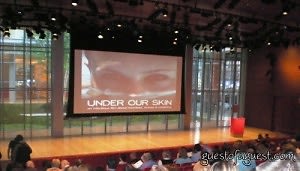Last night, we joined Turn the Corner Foundation and Open Eye Pictures at The Times Center for the Launch Party of “Under Our Skin,” a documentary about the politicization of Lyme disease. Open Eye Pictures is an award-winning, nonprofit company with a penchant for exposing poignant truths and systemic wrongs – often in the same story – through non-fiction film and photography. Turn the Corner is a non-profit organization devoted to research and outreach on Lyme disease and other tick-borne illnesses. The collaborative effort therefore may not have been expected, but it certainly wasn’t surprising.
So far, “Under Our Skin” has been an Audience Choice Award finalist at Triebca, as well as an Official Selection at the Berkshire International Film Festival. Acclaim, however, isn’t anything new for Andy Abrahams Wilson, founder of Open Eye Pictures and Producer/Director for most, if not all, of Open Eye Pictures productions. After an Emmy nomination for his HBO special Bubbeh Lee & Me, along with many other awards and distinctions, we expected a lot from Andy and “Under Our Skin.” Lucky for us, Andy doesn’t disappoint.
Which is good for him since, had he disappointed, the standing ovation and all that screaming he received upon taking the stage before the show would have been rendered … well, it might have been embarrassing.
Prior to this event we had little clue as to what Lyme disease is, save for the whole tick bite/bull’s-eye phenomenon. As we watched the feature, we were disheartened to learn just how much more it is than that. Here is what we didn’t realize:
Lyme disease is beyond ubiquitous, especially here in the tri-state area. Entire families and even communities in New York, New Jersey, and Connecticut (as well as across the country) are debilitated by the disease.
Due to the likelihood of misdiagnosis, Lyme disease is far more prevalent than anyone realizes.
The bacteria causing Lyme disease can infiltrate every major (and minor) organ of he body, mimicking the symptoms of everything from depression to syphilis to Lou Gehrig’s disease. Even with treatment, it is often a life-long fight. Gone untreated, people live and die with otherwise treatable incarnations of the diseases that Lyme mimics -- Alzheimer’s, Parkinson’s, Lou Gehrig’s, etc. It makes one wonder whether Morrie really had to be limited to Tuesdays.
Since the medical community does not officially recognize a chronic form of the disease (in fact, it officially limits treatment and diagnosis), a tick bite often leads to years of unnecessary suffering and hundreds of thousands of dollars worth of misdiagnoses. To make matters worse, the doctors who recognize a chronic form are often at risk of disciplinary action from state medical boards due to complaints lodged against them by insurers loathe to foot the bill for aggressive treatment. This leaves those suffering from the disease with few, if any, treatment options.
Much of the “frontier research” on the disease is being done by Alan MacDonald, PhD. – in his basement. With the help of Turn the Corner, MacDonald has been able to link the bacteria causing Lyme to degenerative diseases that have no known causes; diseases such as Alzheimer’s, Lou Gehrig’s, Parkinson’s, and Multiple Sclerosis.
At the heart of this “systemic breakdown” is the insurance lobby, the commercialization of the research agenda, the lack of vetting with respect to members of the Infectious Diseases Society of America (the governing body that sets treatment guidelines), and the nature of the disease itself, which is so elusive and random in its effects that a chronic form has been dismissed by some doctors as entirely psychosomatic.
We highly recommend purchasing a copy of “Under Our Skin.” Since the movie has only been around for a couple of weeks, obtaining a copy may take some resourcefulness. There are, however, no-frills copies available somewhere at Open Eye Pictures. If you aren’t that motivated, just wait a while for copies to go on sale officially on the Open Eye Pictures website, linked above. Not to mention – we have a feeling that this isn’t the last we’ll be seeing of “Under Our Skin.”





.jpg)
.jpg)



.jpg)
.jpg)
.jpg)

.jpg)
.jpg)

.jpg)